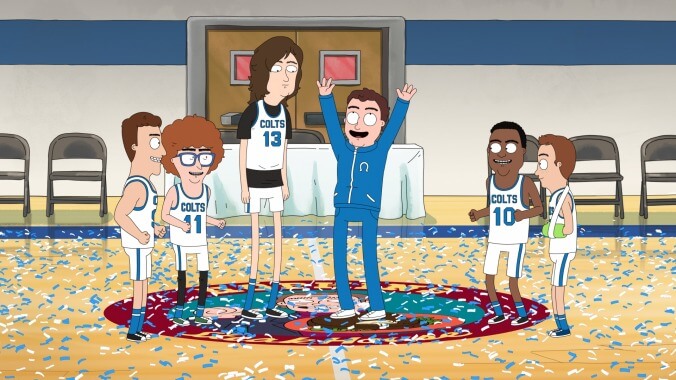The sitcom’s focal point is Ben Hopkins (Johnson), a foul-mouthed high school basketball coach. His acerbic personality’s saving grace is his passion for the sport and the students he teaches, especially new recruit Matty (A.D. Miles), who’s the only relatively talented player (oh, and he’s tall). The rest of the Lenwood High team, from Billy Joel-obsessed Marcus (Sam Richardson) to the stout DJ (Steve Berg), lack the height and skill. The bulk of season one is dedicated to Coach Ben and his complex, mostly futile ways to build up morale and game techniques while trying to patch things up with his estranged wife Shannon (Natasha Leggero).
But Hoops struggles to find its footing, especially in the first half. As a sort of antihero, Ben is a one-note character from start to end. Hoops isn’t concerned with employing nuanced storytelling to demonstrate growth for Ben or any other character. Despite genuine concern for his players (it’s hidden deep down), Ben often leads his team by interfering in their personal lives as opposed to actually coaching them. When he does coach, it’s obvious he’s not any good at it. He can be narcissistic and problematic, but Ben’s behavior is rarely questioned; after a while, it’s just accepted as the norm, even by the school principal Opal (Cleo King), with whom he forms a semblance of a friendship.
Ben shares a tumultuous bond with his father, pro basketball player Barry (Rob Riggle), or as he is referred to in an episode: “a runner up for the 6th best man of the year by the American Basketball Association, which makes him the 7th best man.” Ben’s obsession with seeing the Lenwood High team triumph is to establish his own worth to Barry; almost every decision he makes is subconsciously driven by this desire. The daddy issues trope has been well-explored on numerous shows, including BoJack Horseman, and Hoops touches upon it through the unexpected bond Ben shares with Matty, who was raised by a single mother and vies for a paternal figure in his life. Even though it might be for his own selfish reasons, and he might not even realize it, Ben fills that void for Matty. A parallel between these two relationships is hinted at early on, but it never develops into any astute insight, which undermines the only emotionally charged angle of the show.
Johnson has admitted in interviews (including one with The A.V. Club) that what the show “isn’t trying to do is make you think.” The actor’s said sometimes he just wants to watch something for 22 minutes and laugh. Hoops gets that part right. The writing embraces the malarkey of the plot, worrying less about meaning and focusing on pop culture quips about The Kominsky Method, 27 Dresses, The Grateful Dead, and John Mayer. The best episode of the bunch, titled “Death,” offers more backstory on how Ben became this sardonic, as well as intriguing flashbacks for multiple characters including Shannon, Barry, Opal, and Ben’s assistant coach Ron. It’s a welcome change, because up until this point, these characters have been sidelined. Opal and Ron especially have depths that remain unexplored. We don’t even get insight into Matty—arguably the second lead—and what drives him besides basketball. This narrative short shrift makes it difficult to connect with anyone not named Ben Hopkins.
Ben does eventually get closer to the people in his life, but neither he nor the overall story progress much by the end of the season. Johnson’s impressive voice acting—he’s shown his mettle in Spider-Man: Into The Spider-Verse and Smurfs: The Lost Village—doesn’t make it easier to root for Ben, who shares the grumpy manchild trait with Nick Miller but multiplied by 10 (there are even a few New Girl reunions, as Max Greenfield, Hannah Simone, and Damon Wayans Jr. all have cameos). Ben’s self-indulgent and cynical without warmth or thoughtfulness. The rest of the main cast do their best—and their best Kentucky accents—but the series lacks a vision of where it wants its characters to go or the message it sends, a quality that’s set shows like BoJack Horseman and Big Mouth apart from other animated offerings. To mix sport metaphors, Hoops is like a racehorse with blinders on. It’s got one goal: trying hard to make audiences laugh with jarring comedy that it turns into a predictable mess, squandering its potential for multi-dimensional storytelling.









































